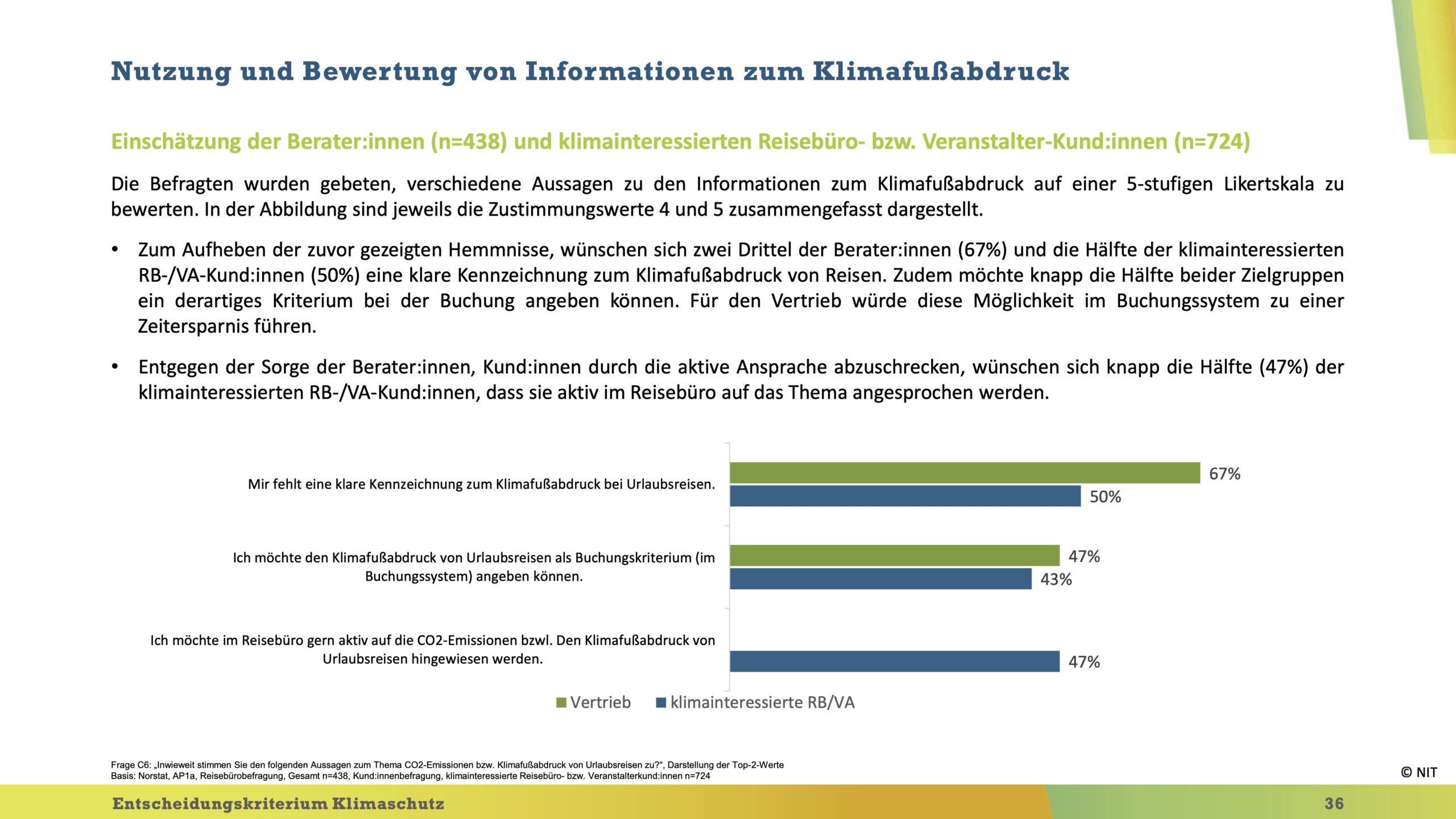:format(webp))
Customers want to be addressed on the climate impact of travel
The sustainability initiative Futouris e.V., together with the Institute for Tourism and Spa Research Northern Europe (NIT), conducted a quantitative online survey with over 2,000 customers and more than 430 travel agency employees to investigate attitudes and competence with regard to climate information on travel
:format(webp))
"The results show that the majority of consultations in travel agencies currently take place without information on the carbon footprint being discussed. On the other hand, there is a very large proportion of customers who are open to information. There is great untapped potential for advice, particularly among travel agency customers who are interested in the climate. By providing information on climate protection, the quality of the consultation could be improved and more climate-friendly booking behaviour could be achieved."
Dr. Friedericke Kuhn, Project Manager NIT
The aim of the study was to investigate the current level of knowledge and attitudes regarding information on the climate impact of travel for both target groups, as well as to survey travel agencies to determine the extent to which information on the climate footprint currently plays a role in the sale of travel.
More than 430 travel sales consultants and over 2,000 customers were surveyed.

Both target groups do not feel well informed about the climate impact of travel
More than 80% of the travel agents surveyed have a (very) positive attitude towards sustainability and climate protection. Customers also have a rather positive attitude towards the sustainability of vacation trips, with a stronger focus on social compatibility (56%) than on environmental friendliness (42%). 36% of the customers surveyed already try to minimize the carbon footprint of their travel.
52% of the travel agents surveyed think that they can help reduce environmental problems by recommending environmentally friendly trips, as customers generally follow their recommendations. However, the self-assessment of advisors shows that less than half (38%) feel well informed about the climate impact of travel and only 17% about the CO2 emissions of travel. This shows a high need for information on the topic of climate protection in travel sales.
This is also confirmed by the assessment of the customers surveyed who are interested in climate protection and who book through travel agencies; only around 30% of them consider the travel agents to be well or very well informed on the topic of the climate footprint of vacation travel.
The need for information on climate protection information on the part of advisors is correspondingly high, with information in the booking system (73%) being requested most frequently, followed by material from tour operators (64%) or active offers for webinars (63%).
In most consultations, no climate-related information is mentioned, although customers would like this.
More than half of the travel agency consultants surveyed do not mention information on the climate footprint of travel in (almost) any consultation. According to travel agents, active inquiries by customers are even rarer.
Travel agents cite various factors as the reasons for this. for example, 53% find it difficult to find information on the topic and 51% cite a lack of time as an inhibiting factor. In addition, 59% of respondents are concerned that addressing customers with information on the climate footprint of travel will put them off.
It is therefore not surprising that 69% of travel agency customers with an interest in the climate have not yet received any climate information in a consultation.
In stark contrast to this, the majority of customers (77%) are open to receiving information on the climate footprint of travel. Just under half of travel agency customers with an interest in the climate even explicitly want to be actively addressed on the topic during the consultation.
At the same time, both target groups name the consultation at the travel agency as one of the optimal communication channels when it comes to communicating information on the climate footprint of travel. However, the consultation should definitely be supplemented with written information to take home. From the customer's point of view, this particularly includes offer information by email or printout.
In order to reduce the obstacles and challenges mentioned in the survey, 67% of travel agency sales staff and half of climate-interested travel agency customers would like to see clear labeling of the CO2 emissions of a vacation trip. Almost half of both target groups would like to be able to specify the climate footprint of vacation trips as a booking criterion, and the label should be available on all booking channels.
Ralf Hieke, travel agency owner, Futouris board member and DRV Vice President: "The results show once again that better information on more climate-friendly travel must be provided in travel sales. We are therefore doing everything we can to ensure that the climate footprints of the offers are visible in the information and booking systems from 2024. To accompany this, we will be launching a major training and awareness campaign."
The survey of target groups was conducted as part of the LIFT Klima funding measure for more climate protection in tourism by the Federal Ministry of Economic Affairs and Climate Protection (BMWK). In addition to Futouris and the NIT, partners in the project were the Center for Sustainable Tourism (ZENAT) and the German Travel Association (DRV).
